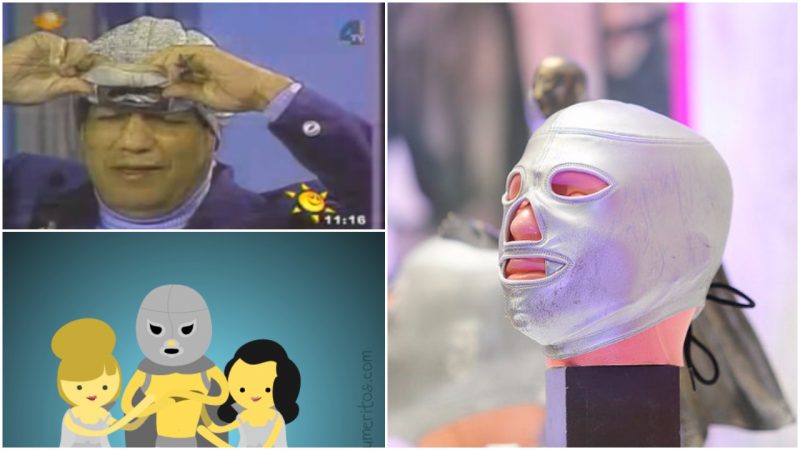The worldwide popularity of Mexico’s lucha libre, the fast-paced Mexican version of professional wrestling, owes a great deal to the silver-masked El Santo, the alter ego of Mexican wrestler Rodolfo Guzman. Santo, as everybody calls him, became a cultural figure who not only reigned over the wrestling ring but also was a symbol of Mexico, and people adored him. He rose to the status of a folk icon; an animated series was made about him, as well as comics drawn with Santo as protagonist. He acted in more than 50 movies.
He was known to never, ever take off his mask, meaning that for most of his career, many of his fans never saw his face. Neither his collaborators nor his crew knew what he looked like, nor did he take the mask off during private meetings. He had a special “mealtime” mask that had the mouth cut away to allow him to eat. When he was supposed to travel with his crew by plane, El Santo would always carefully book a different flight for himself to avoid being seen by his team.
Rodolfo Guzman Huerta was born on September 23, 1917, and spent his childhood and youth playing baseball and American football. He first learned jujitsu and later classical wrestling. He became enchanted by the art of lucha libre, and in 1934 made his debut in the professional wrestling ring as Rudy Guzman (Rudo means a bad guy in Spanish), which was the start of his legendary career.

By the late 1930s, Guzman was an established wrestler who fought under different names: El Demonio Negro (the Black Demon), El Hombre Rojo (the Red Man) and El Murcielago II (the Bat II). However, an original El Murcielago, the wrestler Jesus Velazquez, appealed to the commission for boxing and wrestling in Mexico that Guzman couldn’t use the name. So, he adopted the name El Santo after it was suggested by his manager, and on the 26th of June, 1942, Guzman wrestled for the first time as El Santo at the Arena Mexico.
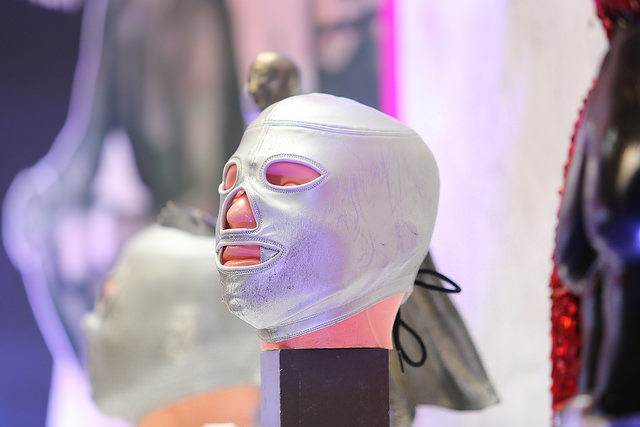
El Santo became a kind of Mexican hero after the legendary match with Black Shadow in 1953, during which Santo unmasked his opponent in the ring. That made Black Shadow retire from wrestling, because to lose the mask in a lucha libre was the ultimate defeat. However, his victory was soon followed by just as much of a “legendary” defeat from the Blue Demon that same year. Even though the two wrestlers acted together in a number of action and adventure films, it is said that their rivalry lasted forever, mainly because Santo couldn’t let go of his loss.
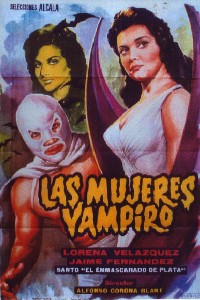
In 1952, El Santo became a comic-book character in the work of comics writer José G. Cruz, and his popularity could be compared to that of the superhero Kaliman. Since the comics with El Santo were such a smash hit in Mexico, he got his first role in the 1958 movie Santo vs. the Evil Brain. He also became a movie star who performed in more than 50 movies, including Santo Faces Death, Santo Vs. the Zombies, Santo Vs. Frankenstein’s Daughter, and the most celebrated one from 1962, Santo Vs. the Vampire Women.
El Santo married María de Los Ángeles Rodríguez Montaño in the early 1940s, and they had 10 children. The Mexican hero continued to wrestle and act until 1982. He fought during his farewell tour, which ended a week before his 65th birthday. During his career, Santo always managed to keep his mask on his face and furthermore, to not ever let his fans (which included almost the whole of Mexico) see his face until 1984.
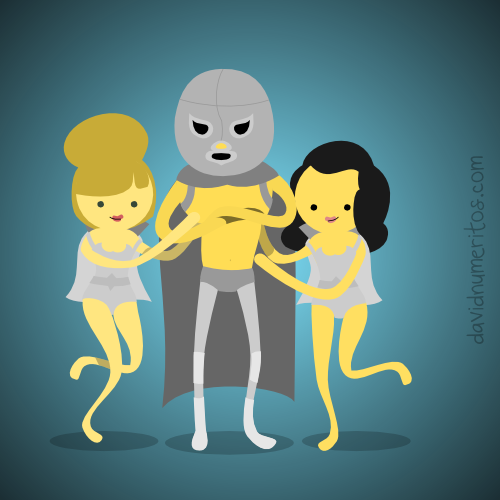
That year he finally took his mask off in public, during the talk show “Contrapunto.” He died 10 days later of a heart attack on the 5th of February. In his hometown of Tulancingo the first statue of El Santo was erected, with many to follow across Mexico.
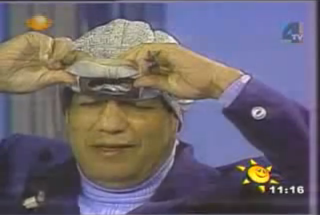
Santo’s youngest son, Jorge Ernesto Guzmán Rodríguez, followed in his father’s footsteps with a wrestling career. Inheriting the silver mask, he fought under the name El Hijo del Santo. After his retirement in 2014, Santo’s grandson (from another of his sons) started wrestling as El Santo, Jr. in Japan.
Read another story from us: The unsolved mystery behind the Man in the Iron mask
On the 23rd of September of this year, Google Doodle celebrated El Santo’s 100th birthday. To “translate” his importance to the world, Felipe Carrillo Montiel, an El Santo expert, has said, “While Americans had Superman, Batman or Spider-Man, we had Rodolfo Guzman, El Santo, fighting everybody from the mummies to the Nazis, but unlike those American superheroes, he was a real man—you could read his comics during the week and then go see him wrestle on the weekend at your local arena.”
